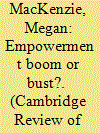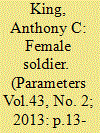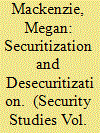|
|
|
Sort Order |
|
|
|
Items / Page
|
|
|
|
|
|
|
| Srl | Item |
| 1 |
ID:
089476


|
|
|
|
|
| Publication |
2009.
|
| Summary/Abstract |
Over the past decade, the term 'empowerment' has been generously employed and woefully ill-defined. In particular, women's empowerment has been embraced by such a vast number of development actors that it appears to be a unifying mission within development. Despite the boom in women's empowerment initiatives, there remains little critical analysis of the use of empowerment in general, and the perceived success or failures of specific empowerment initiatives. Using the disarmament, demobilization and reintegration process in Sierra Leone as a case study, this paper examines how reintegration was described as a source of empowerment for women. Drawing from interviews and analysis of related policy discourses, it is argued that, rather than representing a radical shift in development approaches towards more inclusive and representative policies, empowerment projects are shaped by neoliberal ideas such as individualism, responsibility and economic order and carry implicit, gendered and disciplining messages about appropriate social behaviour.
|
|
|
|
|
|
|
|
|
|
|
|
|
|
|
|
| 2 |
ID:
124231


|
|
|
|
|
| Publication |
2013.
|
| Summary/Abstract |
Since the 1970s, women have been increasingly integrated into the military; in Iraq and Afghanistan many women served on the frontline in combat. This article argues women's integration has been facilitated by the all-volunteer professional forces in which individuals are judged purely by competence. Female soldiers have been accepted in all military roles if they perform competently. There are serious limitations in the infantry, however, as only a small number of women pass the selection tests and it is likely no more than one percent of the infantry could be female at present. Moreover, masculine prejudices abound and women are still the victims of discrimination, harassment, and abuse.
|
|
|
|
|
|
|
|
|
|
|
|
|
|
|
|
| 3 |
ID:
088710


|
|
|
|
|
| Publication |
2009.
|
| Summary/Abstract |
This article focuses on the construction of "soldier" and "victim" by post-conflict programs in Sierra Leone. Focusing on the absence of individual testimonies and interviews that inform representations of women and girls post-conflict, this article demonstrates that the ideal of the female war victim has limited the ways in which female combatants are addressed by disarmament, demobilization, and reintegration (DDR) programs in Sierra Leone. It is argued that titles given to female soldiers such as "females associated with the war," "dependents," or "camp followers" reveal the reluctance of reintegration agencies to identify females who participated in war as soldiers. In addition, I argue that men and masculinity are securitized post-conflict while women-even when they act in highly securitized roles such as soldiers-are desecuritized and, in effect, de-emphasized in post-conflict policy making. The impact of this categorization has been that the reintegration process for men has been securitized, or emphasized as an essential element of the transition from war to peace. In contrast, the reintegration process for females has been deemed a social concern and has been moralized as a return to normal
|
|
|
|
|
|
|
|
|
|
|
|
|
|
|
|
|
|
|
|
|